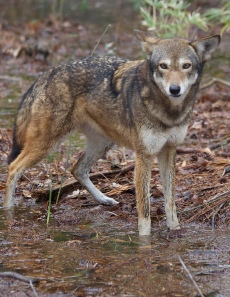Feb
10, 2914
Last week I had an interesting Twitter conversation with a young woman from the western Great Lakes area, Christine Wickham.
I knew from our previous exchanges that she’s highly interested in gray
wolf conservation, and that she’s been pretty upset by the sanctioned
wolf hunts in her home state of Michigan. So I wasn’t too surprised when
she replied to a tweet that I sent out that read, “Disappointing that national conversation on wolf conservation has yet to include the crisis red wolves face.”
She replied to me wanting to know why this is, and I told her I’ve been
contemplating this exact question for the past four or more years.Why is it that red wolves are so unloved and unsupported by conservationists? Jan DeBlieu put it best when she wrote:
If wolves are animals of savage and demonic qualities, as myth and folklore portray them, then red wolves have been doubly damned. They are despised, on the one hand, by people who think of wolves as bloodthirsty and sinister, yet they are often overlooked by those who might be expected to rush to their defense. (Meant to Be Wild, 1993)This quote spoke to me on so many different levels, that I placed it at the beginning of Part I of my book, The Secret World of Red Wolves. Christine’s question embodies the reaction most people have when they first learn of red wolves and their tragic conservation story. So I tweeted a few of my ideas as to why Canis rufus remains so underserved by the conservation community, and so abused by governmental policies that should be protecting them from extinction. Without further ado, here are my tweets:
(1) People get confused because of their ability to hybridize with coyotes, think they are not a “real” species.
(2) Because of this confusion over species status, conservation groups and leaders have lost interest.
(3) Conservation groups’ loss of interest in them leads to loss of exposure/education to the general public.
(4) Some believe bc of the hybridization issues, they can never be recovered, that they are “too far gone.” Too much trouble.
(5) Fish and Wildlife Service, at higher levels, has historically underplayed the program because of fear of failure.
(6) They don’t fit our cultural idea of what a wolf should be: they are smaller, not as aggressive = less charismatic.
(7) State of NC has never embraced the program, has even worked against it, so very little political will to recover them.
(8) ESA listing status was conferred to provide flexibility in recovery, but has produced weak state and federal protections
source


No comments:
Post a Comment